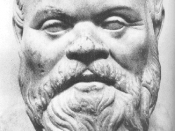Two Theories of Right and Wrong
John Stuart Mill, author of the essay entitled Utilitarianism, gave an in depth theory of right and wrong commonly referred to as utility or the utilitarian view of morality. Utility claims that
actions are right in proportion as they tend to promote happiness; wrong as they tend to produce the reverse of happiness. By happiness is intended pleasure and the absence of pain; by unhappiness pain and privation of pleasure (Mill, p.7.)
In essence, the rightness and wrongness of an act is determined solely by its consequences. Sir W.D. Ross, however, criticizes utilitarianism because he says it is too permissive about lying, but I don't think his criticism can be accepted.
According to Act-Utilitarianism, an act is morally right if and only if there is no other possible alternative act that would result in a better balance of good consequences relative to bad consequences.
If two acts are tied for having the same balance of consequences then it would not matter which course of action was taken because the consequences would be equal. If any action results in more bad consequences then good, the right act would be the one resulting in the least amount of bad relative to good. Act-Utilitarianism requires a lot of careful calculations about the consequences and can be easy misapplied depending on whom the good consequences apply to. Mill says that the good consequences should be for all of society not just for oneself (Carson, Utilitarianism & Hedonism.)
Sir W.D. Ross?s theory of right and wrong is based on what he calls prima facie duties. A prima facie duty is one?s actual duty all, other things equal. That is, with all other courses of action considered its prima facie rightness must outweigh its prima facie wrongness and...


